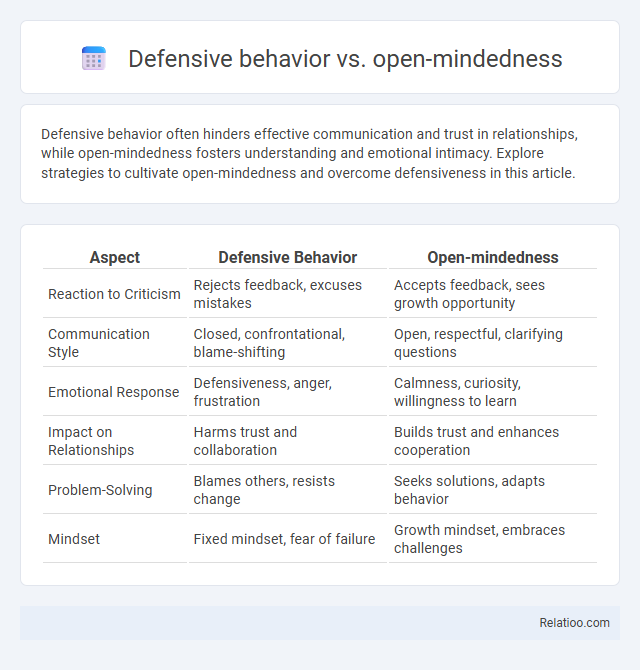Defensive behavior often hinders effective communication and trust in relationships, while open-mindedness fosters understanding and emotional intimacy. Explore strategies to cultivate open-mindedness and overcome defensiveness in this article.
Table of Comparison
| Aspect | Defensive Behavior | Open-mindedness |
|---|---|---|
| Reaction to Criticism | Rejects feedback, excuses mistakes | Accepts feedback, sees growth opportunity |
| Communication Style | Closed, confrontational, blame-shifting | Open, respectful, clarifying questions |
| Emotional Response | Defensiveness, anger, frustration | Calmness, curiosity, willingness to learn |
| Impact on Relationships | Harms trust and collaboration | Builds trust and enhances cooperation |
| Problem-Solving | Blames others, resists change | Seeks solutions, adapts behavior |
| Mindset | Fixed mindset, fear of failure | Growth mindset, embraces challenges |
Understanding Defensive Behavior
Defensive behavior arises from perceived threats to self-esteem or identity, often triggering automatic emotional responses that hinder open communication. Recognizing this behavior involves identifying physical cues like crossed arms or avoidance, alongside verbal patterns such as justification and blame-shifting. Developing open-mindedness requires managing emotional reactivity by fostering empathy, active listening, and self-awareness to reduce defensiveness and promote constructive dialogue.
Defining Open-mindedness
Open-mindedness refers to the willingness to consider new ideas, perspectives, and evidence without bias or premature judgment. It contrasts with defensive behavior, which involves protecting oneself from perceived criticism or threats by rejecting alternative viewpoints. Emotional reactivity often impairs open-mindedness by triggering impulsive responses rather than thoughtful consideration.
Psychological Roots of Defensiveness
Defensive behavior often stems from deeply rooted psychological factors such as fear of judgment, low self-esteem, and unresolved past trauma, which trigger protective emotional responses to perceived threats. Open-mindedness requires cognitive flexibility and emotional regulation, enabling individuals to consider differing perspectives without initiating a defensive stance. Emotional reactivity amplifies defensiveness by heightening sensitivity to criticism, reducing the capacity for reflective processing and increasing impulsive defensive reactions.
Characteristics of Open-minded Individuals
Open-minded individuals exhibit characteristics such as curiosity, empathy, and adaptability, enabling them to consider diverse perspectives without immediate judgment. They demonstrate low emotional reactivity, allowing rational evaluation of information instead of defensive behavior triggered by perceived threats. Your ability to remain receptive and flexible fosters effective communication and problem-solving in complex social and professional environments.
Impact of Defensive Behavior on Relationships
Defensive behavior in relationships often leads to communication breakdowns, as individuals may respond with hostility or withdrawal rather than understanding and empathy. This defensiveness can create a barrier to open-mindedness, reducing emotional intimacy and increasing conflicts. Emotional reactivity intensifies misunderstandings, making it harder to resolve issues and weakening the overall relational bond.
Benefits of Embracing Open-mindedness
Embracing open-mindedness fosters greater cognitive flexibility and enhances problem-solving skills by encouraging the exploration of diverse perspectives. Unlike defensive behavior, which limits growth through resistance to new ideas, open-mindedness cultivates empathy and effective communication, reducing emotional reactivity in challenging situations. This approach promotes resilience and adaptability, essential traits for personal and professional success.
Triggers That Lead to Defensive Responses
Triggers that lead to defensive responses often include perceived criticism, threats to self-esteem, or feelings of vulnerability during interactions, which activate emotional reactivity and hinder open-mindedness. When you encounter feedback that challenges your beliefs or actions, the instinctive defensive behavior can block effective communication and problem-solving. Recognizing these triggers allows for better emotional regulation and fosters a more open-minded approach to difficult conversations.
Barriers to Open-minded Thinking
Defensive behavior creates significant barriers to open-minded thinking by triggering emotional reactivity that clouds judgment and limits your ability to consider alternative perspectives. When emotions dominate, cognitive flexibility diminishes, reinforcing biases and resistance to new information. Overcoming these barriers involves promoting self-awareness and emotional regulation to foster receptive and reflective thinking.
Strategies to Overcome Defensiveness
To overcome defensiveness, focus on developing self-awareness and practicing active listening, allowing you to better understand others' perspectives without immediate judgment. Embrace open-mindedness by challenging your assumptions and welcoming constructive feedback as an opportunity for growth. Managing emotional reactivity through mindfulness techniques and deep breathing can help you stay calm and respond thoughtfully rather than reacting impulsively.
Cultivating Open-mindedness in Daily Life
Cultivating open-mindedness in daily life requires recognizing defensive behavior and emotional reactivity as barriers to growth and understanding. You can enhance your interactions by consciously pausing before reacting emotionally and actively seeking diverse perspectives without judgment. Developing this habit fosters empathy, improves communication, and promotes a more balanced approach to challenges.

Infographic: Defensive behavior vs Open-mindedness
 relatioo.com
relatioo.com